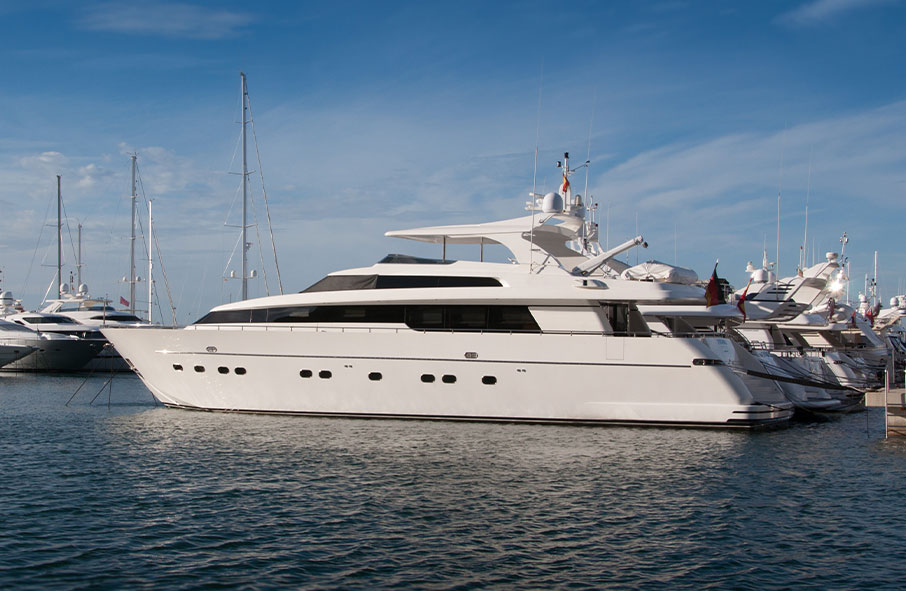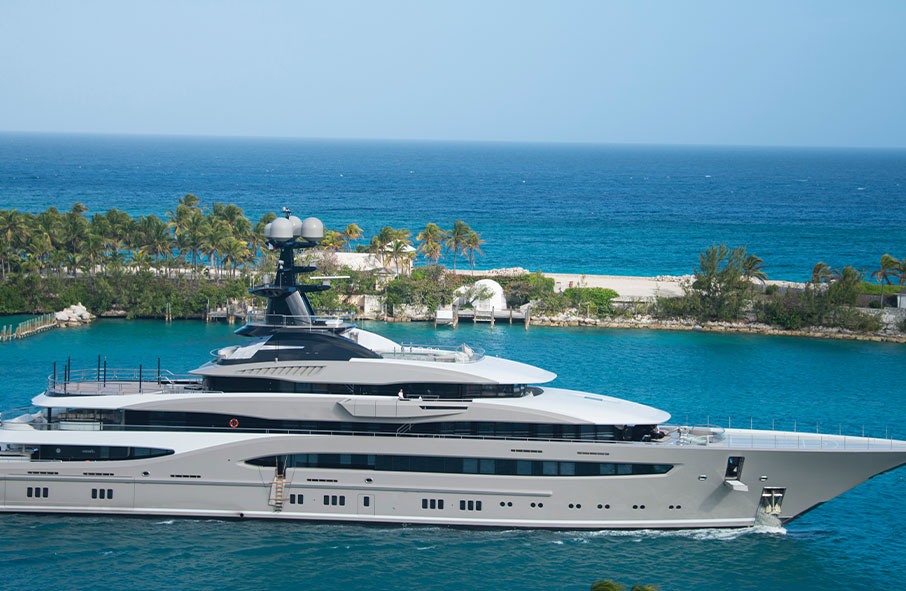When Does a Boat Become a Yacht?
- Authors
-
-

- Name
- Patrick Maflin
-

For centuries, the world of boats and yachts has captivated the hearts and imaginations of seafarers and sailing enthusiasts alike.
Boats are a familiar sight, but the term ‘yacht’ carries an aura of luxury and grandeur.
But what exactly distinguishes a boat from a yacht?
Is it a matter of size alone, or are there other factors at play?
In this article we'll unravel the legal definitions, explore the differences between boats, ships, and yachts, and delve into the opulent world of luxury superyachts and megayachts.
Whether you're a seasoned sailor or merely a curious land-dweller, come aboard as we navigate the intriguing waters of yachting.
- What is the Legal Definition of a Yacht?
- When Does a Boat Become a Yacht?
- What is the Difference Between a Ship and a Yacht?
- What Are the Benefits of Owning a Yacht?
- Conclusion
- Contact Us
What is the Legal Definition of a Yacht?

Navigating the legal waters of yacht classification can be as tricky as sailing through an ocean storm.
The term ‘yacht’ isn't set in stone by international maritime law.
It's more like a flexible buoy that bobs differently in various jurisdictions.
In many countries, the distinction between a boat and a yacht isn't firmly etched into legal code.
Instead, it tends to be influenced by factors like the vessel's size, purpose, and registration.
Broadly speaking, though, we can venture into the waters of understanding by considering the general characteristics that often define a yacht.
Typically, a yacht is viewed as a recreational vessel designed primarily for pleasure, sports, or leisurely cruising.
It's the vessel of choice for those looking to get into yachting, the thrill of watersports, or the leisurely pursuit of the sun's setting rays.
When Does a Boat Become a Yacht?
The line that distinguishes a boat from a yacht is not solely drawn by the length of the vessel's hull cutting through the water, although size certainly plays a prominent role.
The transformation from boat to yacht is, in essence, a transition from utility to luxury, from functionality to leisure.
This distinction, while somewhat subjective, carries cultural and historical significance that goes beyond mere measurements.
In the maritime world, particularly in the United States, where such distinctions are often codified, the U.S. Coast Guard offers a simple but essential guideline for categorizing vessels.
These categorizations are based on length, and they can provide a rough map of the journey from boat to yacht:
Less than 15 feet
In this category, vessels are typically referred to as ‘boats.’
They are generally small, versatile craft used for various water activities like fishing, water skiing, or day trips.
These are vessels where practicality and function tend to outweigh luxury.
15 to 25 feet
As we move into the 16 to 26-foot range, we enter the territory often labelled as ‘small yachts’ or ‘yacht tenders.’
These boats may possess some features associated with yachts, such as more comfortable seating or sleeping arrangements, but they are still relatively modest in size compared to larger yachts.
25 to 75 feet
When a vessel reaches this range, it is typically acknowledged as a yacht.
These boats tend to offer more spacious cabins, additional onboard amenities, and greater comfort for extended cruising or even living aboard.
They cater to a different type of seafaring experience - one infused with a sense of leisure and luxury.
75 feet to 175 feet
Once a vessel reaches above roughly 75 feet, it’s usually termed a ‘super yacht’.
A super yacht is a larger and more luxurious vessel, usually offering enhanced features like multiple decks, spacious cabins, dining areas, and sometimes even swimming pools or helipads.
A yacht this large requires a larger crew to fit the many super yacht crew jobs.
175 feet and above
Once a vessel surpasses the impressive length of 175 feet, it may claim the title of a ‘mega yacht.’
Mega yachts are the epitome of opulence on the water.
These vessels boast multiple decks, lavish cabins, dining salons, swimming pools, hot tubs, helipads, and virtually every conceivable amenity for a life of grandeur on the high seas.
However, the waters of categorization are not always calm and clear, for they shift as we sail into different regions.
Countries around the world may have their criteria for distinguishing boats from yachts.
Regulations and classifications can vary significantly from one place to another, making the transition even more fluid.
In the end, what truly defines a yacht transcends mere measurements.
It's the spirit of luxury, adventure, and leisure on the water.
Whether you're at the helm of a classic sailboat, a sleek motor yacht, or a mega yacht, the essence of yachting remains the same - a celebration of the sea's allure and the joys of life afloat.
What is the Difference Between a Ship and a Yacht?

The distinction between a ship and a yacht goes beyond mere terminology.
It encapsulates fundamental differences in purpose, size, and use within the maritime world.
Purpose
Ships are utilitarian workhorses of the sea.
They are designed primarily for commercial or industrial functions, whether it's transporting goods, facilitating research expeditions, conducting military operations, or serving as fishing vessels.
Their raison d'être lies in their ability to perform specific tasks efficiently.
In contrast, yachts are crafted for leisure and luxury.
They are vessels of enjoyment, designed to offer comfort, pleasure, and relaxation to their passengers.
Yachts exist to create memorable experiences and explore the world's waters at a leisurely pace.
Size
Size stands as one of the most apparent distinctions between ships and yachts.
Ships are, by and large, larger and more massive.
Their dimensions accommodate substantial cargo capacities, scientific equipment, or military hardware.
Ships can range from modest cargo vessels to colossal container ships or aircraft carriers.
They often require professional crews to manage their complex operations.
Yachts, on the other hand, are comparatively smaller.
While their size can vary significantly, they are typically designed to be handled by a smaller crew, or even a single individual, especially in the case of smaller yachts.
This size difference highlights the emphasis on intimacy and personalized experiences in yachting.
Use
The contrast in purpose naturally leads to a divergence in use.
Ships are versatile, serving a multitude of commercial, military, or scientific roles.
They transport goods across oceans, facilitate global trade, conduct research in diverse marine environments, and play pivotal roles in naval activities.
In contrast, yachts are dedicated to leisure activities.
They serve as vessels of exploration, taking their owners and guests on idyllic cruises, sailing adventures, or extravagant vacations.
Yachts become the backdrop for celebrations, relaxation, and watersports, embodying the spirit of enjoyment.
What Are the Benefits of Owning a Yacht?

Owning a yacht, whether it's a modest sailboat or a majestic mega yacht, offers a plethora of enticing benefits that extend well beyond the mere possession of a vessel.
Tax Breaks
In the UK, if you're a resident involved in yacht ownership or working aboard a ship, you might be eligible for a tax break.
The Seafarers Earnings Deduction (SED) is a tax law that provides seafarers with an exemption from income tax on earnings generated overseas, essentially allowing them to claim full tax relief on their overseas income.
Luxury & Comfort
Yachts are one of the greatest showcases of both luxury and comfort.
These floating marvels are designed with meticulous attention to detail.
Lavish cabins, reminiscent of five-star hotel suites, offer plush sleeping quarters and opulent bathrooms.
Gourmet kitchens provide the setting for culinary delights prepared by talented chefs.
Entertainment systems ensure a cinematic experience, whether you're watching the sunset or a blockbuster film.
Every square foot of a yacht exudes elegance and opulence, creating an ambiance of relaxation and indulgence.
Privacy & Freedom
Yachts provide an unparalleled sense of privacy and the freedom to explore uncharted waters.
Unlike crowded resorts or bustling tourist destinations, yachts offer seclusion.
Drop anchor in a secluded cove, and you have your own private paradise.
The gentle lull of the ocean becomes your soundtrack, and the untouched shoreline your sanctuary.
The ability to chart your course, change direction on a whim, and escape the crowds is a hallmark of yacht ownership.
Social Experiences
Yachts are not just vessels - they are venues for unforgettable social experiences.
Whether it's a weekend cruise with close friends or an extended voyage with family during yacht charter season, yachts foster camaraderie and shared moments.
They provide settings for grand celebrations, intimate gatherings, and everything in between.
The spacious decks become stages for sunbathing, al fresco dining, and stargazing.
Yacht ownership becomes a conduit for creating lasting memories with loved ones.
Access to Exclusive Destinations
Yachts are the gateways to a world that remains hidden from land-bound travelers.
They have the ability to access remote and exclusive destinations, unveiling breathtaking vistas and hidden treasures.
Anchoring near pristine beaches that are untouched by resorts, exploring uninhabited islands, or navigating through tranquil fjords becomes a reality.
Yacht owners have the privilege of setting foot on shores where few have ventured before.
Investment
For some, yachts serve as more than vessels of pleasure - they are investments.
High-end yachts, particularly super yachts and mega yachts, can appreciate in value over time.
The allure of these vessels often increases with age, making them coveted assets in the world of luxury.
Savvy owners who carefully select their yachts can potentially see their investment appreciate, offering both enjoyment and financial returns.
In essence, owning a yacht is an immersion into a world of opulence, freedom, and endless exploration.
It's a lifestyle that marries luxury and adventure, a ticket to secluded paradises and cherished memories.
Beyond the vessel itself, it's the embodiment of a passion for the sea, a desire for privacy, and the pursuit of the extraordinary.
Whether it's the thrill of the open ocean, the tranquillity of a secluded bay, or the camaraderie of shared moments, owning a yacht is a gateway to a life less ordinary.
Conclusion
The distinction between a boat and a yacht may not always be clear cut, but one thing is certain - yachting offers a world of luxury, adventure, and relaxation.
Whether you're captivated by the idea of sailing on a small yacht along the coast or dreaming of owning a mega yacht to explore the world's oceans, the allure of yachting is undeniable.
So, whether you set sail on a dinghy or cruise on a super yacht, the experience of being on the water is a unique and cherished one.
Contact Us
If you have questions about the yachting industry, we'd like to hear from you.
Simply get in touch with us today or let us know your thoughts in the comments section below.
Disclaimer: Any advice in this publication is not intended or written by Marine Accounts to be used by a client or entity for the purpose of (i) avoiding penalties that may be imposed on any taxpayer or (ii) promoting, marketing or recommending to another party matters herein.






